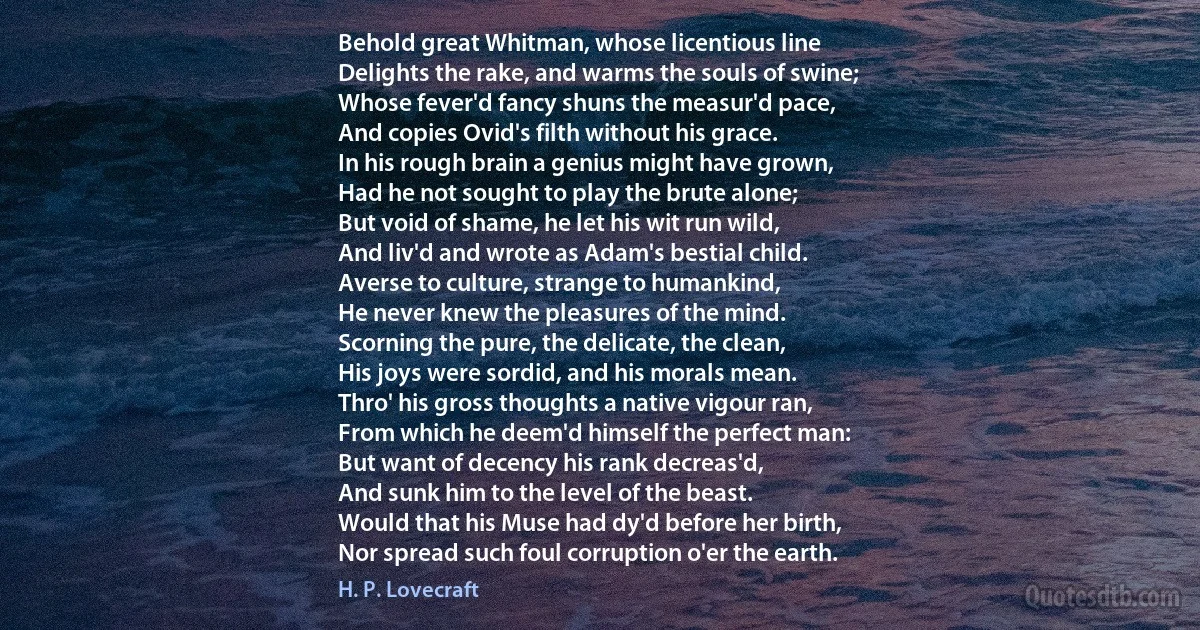
Behold great Whitman, whose licentious line Delights the rake, and warms the souls of swine; Whose fever'd fancy shuns the measur'd pace, And copies Ovid's filth without his grace. In his rough brain a genius might have grown, Had he not sought to play the brute alone; But void of shame, he let his wit run wild, And liv'd and wrote as Adam's bestial child. Averse to culture, strange to humankind, He never knew the pleasures of the mind. Scorning the pure, the delicate, the clean, His joys were sordid, and his morals mean. Thro' his gross thoughts a native vigour ran, From which he deem'd himself the perfect man: But want of decency his rank decreas'd, And sunk him to the level of the beast. Would that his Muse had dy'd before her birth, Nor spread such foul corruption o'er the earth.
H. P. LovecraftRelated topics
beast bestial birth brain child clean earth fancy filth foul genius grace great humankind line man might mean mind muse nor pace perfect play pure ran run seek shame sink spread strange swine wild wit vigour scorningRelated quotes
For us, for our children, Africa and its people teach us a powerful lesson -- that we must uphold the inherent dignity of every human being. Dignity -- that basic idea that by virtue of our common humanity, no matter where we come from, or what we look like, we are all born equal, touched by the grace of God. Every person has worth. Every person matters. Every person deserves to be treated with decency and respect. Throughout much of history, mankind did not see this. Dignity was seen as a virtue reserved to those of rank and privilege, kings and elders. It took a revolution of the spirit, over many centuries, to open our eyes to the dignity of every person. And around the world, generations have struggled to put this idea into practice in laws and in institutions.

Barack Obama
But when there's a vacuum in our democracy, when we don't vote, when we take our basic rights and freedoms for granted, when we turn away and stop paying attention and stop engaging and stop believing and look for the newest diversion, the electronic versions of bread and circuses, then other voices fill the void. A politics of fear and resentment and retrenchment takes hold. And demagogues promise simple fixes to complex problems. They promise to fight for the little guy even as they cater to the wealthiest and the most powerful. They promise to clean up corruption and then plunder away. They start undermining norms that ensure accountability, try to change the rules to entrench their power further. And they appeal to racial nationalism that's barely veiled, if veiled at all.

Barack Obama
A fearful thing stood at the cloister's end
And eyed him for a while, then 'gan to wend
Adown the cloisters, and began again
That rattling, and the moan like fiends in pain.
And as it came on towards him, with its teeth
The body of a slain goat did it tear,
The blood whereof in its hot jaws did seethe,
And on its tongue he saw the smoking hair;
Then his heart sank, and standing trembling there,
Throughout his mind wild thoughts and fearful ran:
"Some fiend she was," he said, "the bane of man."
Yet he abode her still, although his blood
Curdled within him: the thing dropped the goat,
And creeping on, came close to where he stood,
And raised its head to him and wrinkled throat.
Then he cried out and wildly at her smote,
Shutting his eyes, and turned and from the place
Ran swiftly, with a white and ghastly face.

William Morris
First of all, no one knows his place in society, his class position or social status; nor does he know his fortune in the distribution of natural assets and abilities, his intelligence and strength, and the like. Nor, again, does anyone know his conception of the good, the particulars of his rational plan of life, or even the special features of psychology such as his aversion to risk or liability to optimism or pessimism. More than this, I assume that the parties do not know the particular circumstances of their own society. That is, they do not know its particular economic or political situation, or the level of civilization and culture it has been able to achieve. The persons in the original position have no information as to which generation they belong.

John Rawls
In every nation thou beholdest unnumbered spiritual leaders who are bereft of true discernment, and among every people thou dost encounter myriads of adherents who are devoid of the same characteristic. Ponder for a while in thy heart, have pity on thyself and turn not aside thine attention from proofs and evidences. However, seek not proofs and evidences after thine idle fancy; but rather base thy proofs upon what God hath appointed. Moreover, know thou that neither being a man of learning nor being a follower is in itself a source of glory. If thou art a man of learning, thy knowledge becometh an honour, and if thou art a follower, thine adherence unto leadership becometh an honour, only when these conform to the good-pleasure of God.

Báb
